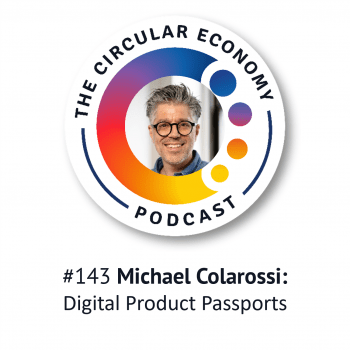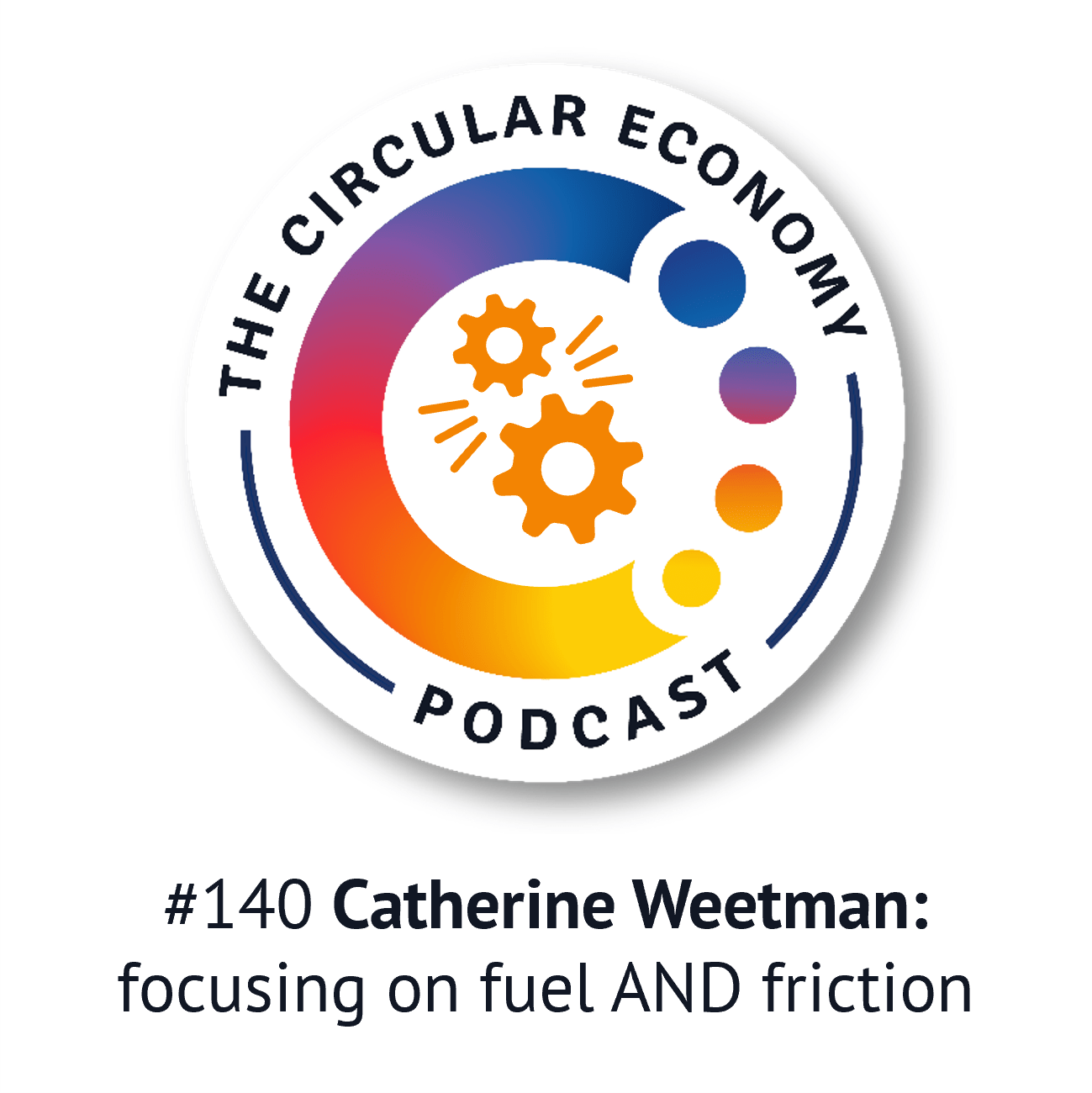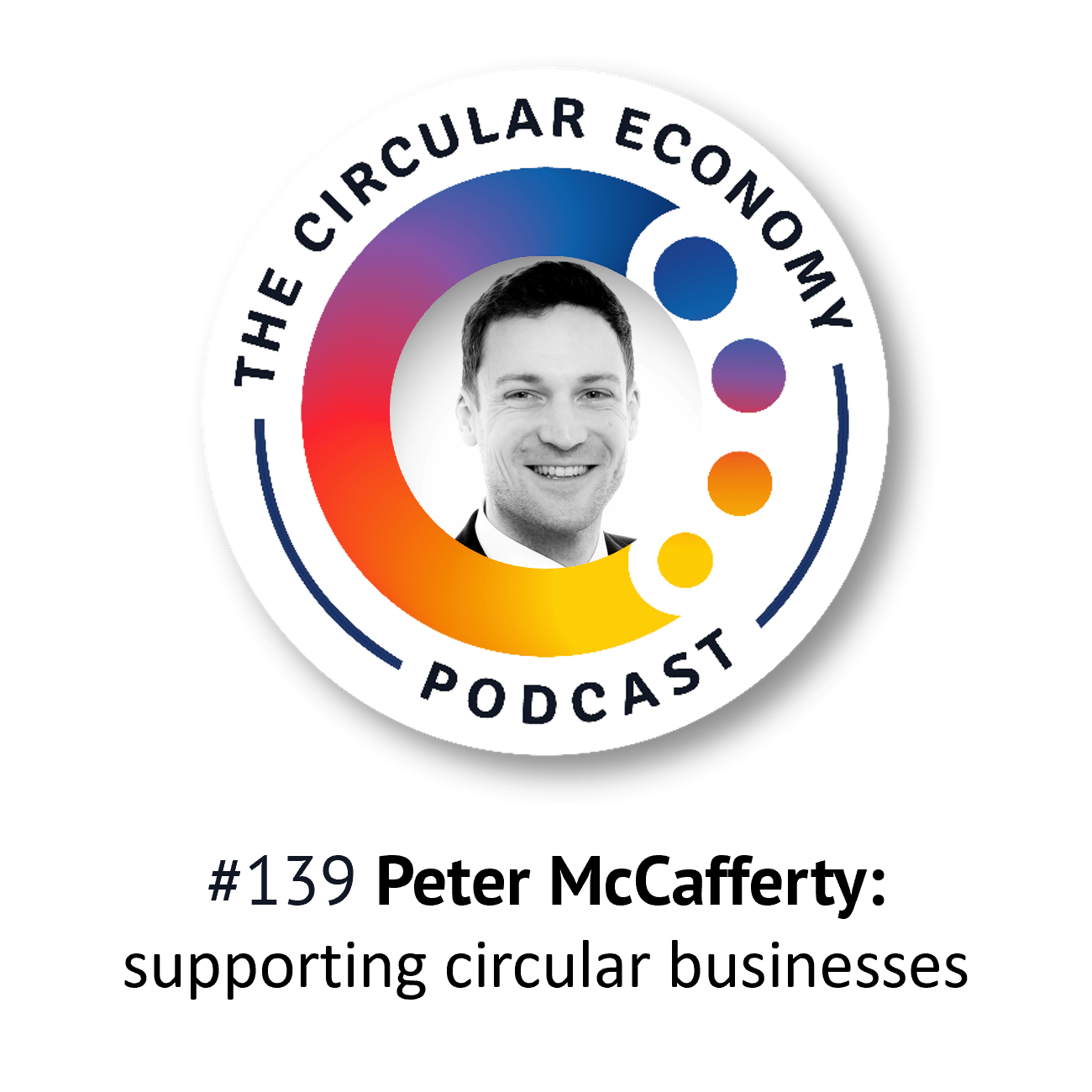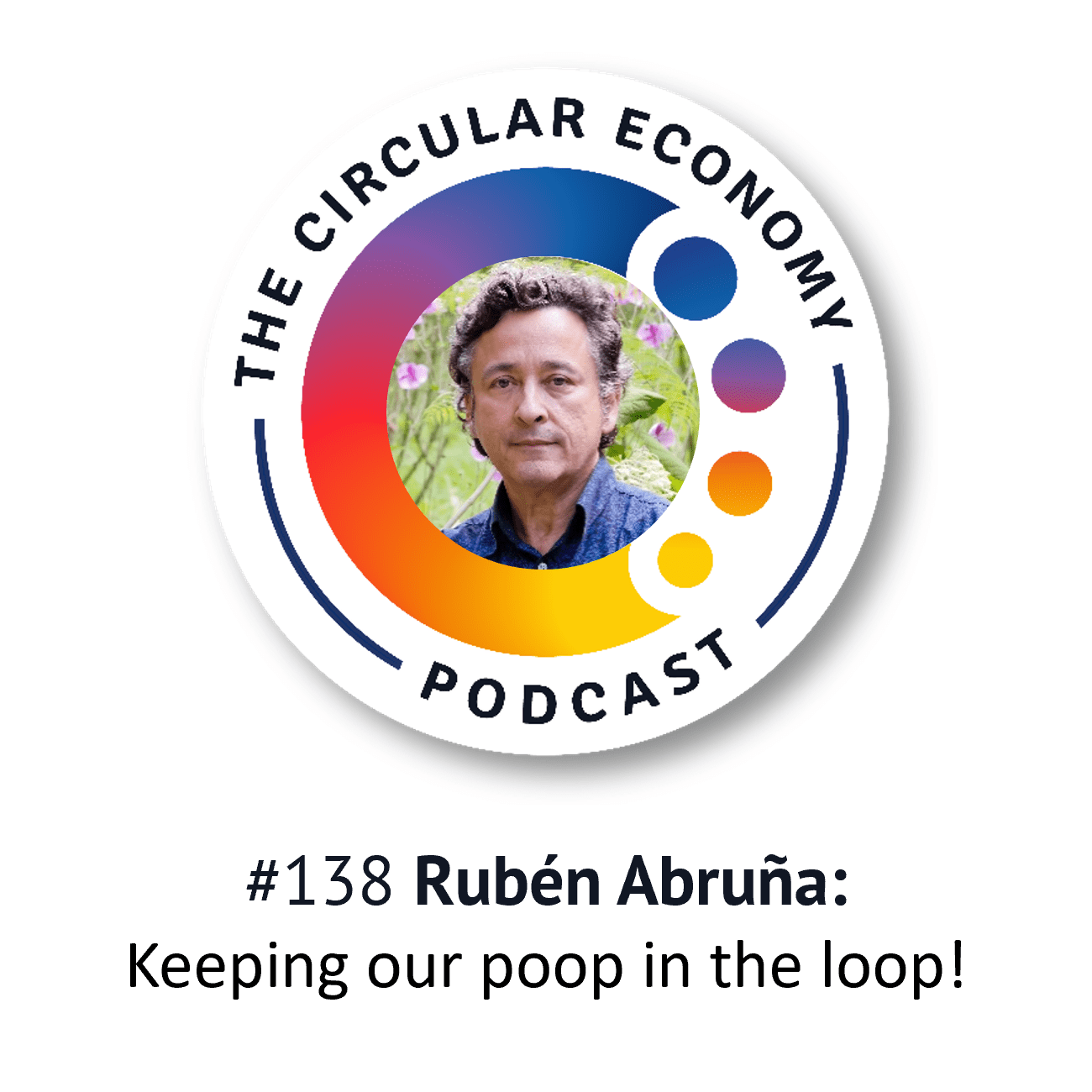Работайте офлайн с приложением Player FM !
143 Michael Colarossi – Digital Product Passports
Manage episode 445950667 series 2592657

Michael Colarossi of Avery Dennison explains how Digital Product Passports can be a key enabler in the transition to a circular economy.
Michael is head of Enterprise Sustainability at Avery Dennison, which specializes in global materials science and digital identification solutions. As part of the the leadership team, Michael is responsible for environmental, social and governance (ESG) strategy across the company’s worldwide operations. His work focuses on climate action, decarbonization, global supply chain transparency, digital product passports, circular labels and packaging materials.
You might already know that the European Union is rolling out a new regulation meaning that nearly all products sold in the EU will require a Digital Product Passport (DPP). The initiative is part of the Ecodesign for Sustainable Products Regulation, and aims to enhance transparency and improve availability of reliable product data, by providing comprehensive information about each product’s origin, materials, environmental impact, and recommendations for disposal.
The EU Digital Product Passport will include a unique product identifier, compliance documentation, and information on substances of concern. It will also provide user manuals, safety instructions, and guidance on product disposal. The EU intends that Digital Product Passports will enhance supply chain management, ensure regulatory compliance, and help companies identify and mitigate risks related to authenticity and environmental impact.
For example, those products like mattresses, sofas and other home furnishings often contain multiple materials, including some natural fibres like wool and cotton, plus synthetics like polyester. The more we know about the make up of the product, the easier it is to decide whether and how it could be refurbished, remanfactured or recycled.
The EU regulations will be mandatory for industrial and electric vehicle batteries from 2027, and other product categories, including textiles, are expected to follow by 2030.
Michael Colarossi gives us a broader overview of Digital Product Passports, including what kinds of products are they useful for, and what forms they take.
As Michael explains, the EU regulations only require the passport to provide details for the type of product – not for every individual unit of that product. We discuss why that more detailed approach would be better.
We talk about the potential for Digital Product Passports to guard against fraud and misinformation
This isn’t straightforward, and we talk about some of the barriers and difficulties from a company perspective, together with the advantages that help make a good business case for doing it, even without the legislation.
And, in case you’re not familiar with the abbreviations that come up, RFID means Radio Frequency Identification Device, and NFC means Near Field Communication.
International speaker, author and strategic advisor, Catherine Weetman helps people discover why circular, regenerative and fair solutions are better for people, planet – and prosperity.
Catherine’s award-winning book: A Circular Economy Handbook: How to Build a More Resilient, Competitive and Sustainable Business includes lots of practical examples and tips on getting started.
Stay in touch for free insights and updates…
Read on for more on our guest and links to the people, organisations and other resources we mention.
Don’t forget, you can subscribe to the podcast series on iTunes, Google Podcasts, PlayerFM, Spotify, TuneIn, or search for “circular economy” in your favourite podcast app. Stay in touch to get free insights and updates, direct to your inbox…
You can also use our interactive, searchable podcast index to find episodes by sector, by region or by circular strategy. Plus, there is now a regular Circular Economy Podcast newsletter, so you get the latest episode show notes and links delivered to your inbox on Sunday morning, each fortnight. The newsletter includes a link to the episode page on our website, with an audio player. You can subscribe by clicking this link to update your preferences.
Links we mention in the episode:
Links for our guest:
- Web: https://rfid.averydennison.com/en/home.html
- LinkedIn Michael Colarossi: https://www.linkedin.com/in/mike-colarossi-84b56a3/
- LinkedIn Avery Dennison: https://www.linkedin.com/company/avery-dennison/posts/?feedView=all
Books, people and organisations we mentioned
- EU Circular Economy Platform – info on Digital Product Passports and a paper from German Economic Institute https://circulareconomy.europa.eu/platform/en/knowledge/digital-product-passport-enabler-circular-economy
Catherine’s work:
- Circular Economy Podcast on LinkedIn: linkedin.com/showcase/circular-economy-podcast/
- Circular Economy Podcast website: circulareconomypodcast.com
- Catherine Weetman on LinkedIn: https://www.linkedin.com/in/catherine-weetman-9419107/
- A Circular Economy Handbook: How to Build a More Resilient, Competitive and Sustainable Business – buy from any good bookseller, or direct from the publisher Kogan Page, which ships worldwide (free shipping to UK and US) https://www.koganpage.com/CircEcon2
- Interactive podcast index https://www.rethinkglobal.info/circular-economy-podcast-index/
- Rethink Global www.rethinkglobal.info
- Sign up to get the podcast player and shownotes for each new episode emailed to your inbox
Guest bio
Michael Colarossi serves as head of Enterprise Sustainability at Avery Dennison, a global materials science and digital identification solutions company.
Michael leads environmental, social and governance (ESG) strategy across the company’s worldwide operations. In this role, he partners with its two business segments, the Materials and Solutions Groups, to ensure the company achieves its 2030 sustainability goals. This work focuses on climate action, global supply chain transparency, digital product passports, circular labels and packaging materials, and decarbonization. Michael serves on the leadership team at Avery Dennison and leads the corporation’s Sustainability Council.
Michael joined Avery Dennison in 2013 and has been engaged in sustainability for 25 years. Previously, Michael held the positions of vice president, Product Line Management, Innovation and Sustainability, Apparel Solutions, and vice president, Sourcing and Supply Chain, Apparel Solutions.
He holds a Bachelor of Science in chemical engineering from the University of Michigan, College of Engineering and a Master of Business Administration from Duke University’s Fuqua School of Business. Notably, he serves on the NYSE Sustainability Advisory Council, which addresses investor and asset manager engagement on sustainability and ESG topics.
About Avery Dennison
Avery Dennison Corporation (NYSE: AVY) is a global materials science and digital identification solutions company that provides a wide range of branding and information solutions that optimize labor and supply chain efficiency, reduce waste, advance sustainability, circularity and transparency, and better connect brands and consumers. Our products and solutions include labeling and functional materials, radio frequency identification (RFID) inlays and tags, software applications that connect the physical and digital, and a variety of products and solutions that enhance branded packaging and carry or display information that improves the customer experience. Serving an array of industries worldwide — including home and personal care, apparel, general retail, e-commerce, logistics, food and grocery, pharmaceuticals and automotive — we employ approximately 35,000 employees in more than 50 countries. Our reported sales in 2023 were $8.4 billion. Learn more at www.averydennison.com.
Playlist: getting started with the circular economy…
Want to know more about the what the circular economy really is, and how it can help your business? Here’s a playlist to help you get to grips with the concept, how it creates value, and the common myths (spoiler alert – it’s much more than recycling!)
- #1 What is the circular economy: A quick intro to explain what the circular economy is and why it’s important. We explore how it helps create better products and services, and at the same time helps to make a better world. I break it down into my 5 circular economy components, helping you think about each part of your business.
- #2 The linear economy and your risk checklist: We dig a bit deeper into the way we do business now, the linear economy, and why that’s creating problems for business, society and our living planet. Also, we’ll look at the risks that emerge from those big-picture issues, and how they might affect your organisation.
- #90 Does circular mean it’s sustainable? Catherine Weetman is worried that companies are using circular economy solutions to grow their business (and their footprints).
- #101 Circular is better for people, planet and profit! How three simple strategies can help you get started with circular and regenerative solutions that are better for people, planet and profit.
- #120 Priorities are changing: people find life is better when we care for and share things – circular economy strategies make that better for business, too.
And here’s Catherine’s guide: What is the circular economy?
Want to dig deeper?
Why not buy Catherine’s award-winning book, A Circular Economy Handbook: How to Build a More Resilient, Competitive and Sustainable Business. This comprehensive guide uses a bottom-up, practical approach, and includes hundreds of real examples from around the world, to help you really ‘get’ the circular economy. Even better, you’ll be inspired with ideas to make your own business more competitive, resilient and sustainable.
Please let us know what you think of the podcast – and we’d love it if you could leave us a review on iTunes, or wherever you find your podcasts. Or send us an email…
Please let us know what you think of the podcast – and we’d love it if you could leave us a review on iTunes, or wherever you find your podcasts. Or send us an email…
Podcast music
Thanks to Belinda O’Hooley and Heidi Tidow, otherwise known as the brilliant, inventive and generous folk duo, O’Hooley & Tidow for allowing me to use the instrumentals from the live version of Summat’s Brewin’ as music for the podcast. You can find the whole track (inspired by the Copper Family song “Oh Good Ale”) on their album, also called Summat’s Brewin’. Or, follow them on Twitter.
Previous episodes….
142 Anna De Matos – igniting circular communities
6th October 2024
Circular economy
community
repair
sharing
social value
Anna De Matos is the founder of several community-focused sharing initiatives, and a force of nature. Originally from Brazil, Anna De Matos went to university in the UK and moved to Iceland in 2017. Inspired by a visit to Toronto’s tool library, Anna started a tool library and repair café, and managed to bootstrap and crowdfund her way to establishing…
141 Joel Tasche: scaleable solutions to plastic pollution
22nd September 2024
Circular economy
enablers
plastics
recycling
social value
Joel Tasche founded CleanHub, a Berlin-based company that provides a scalable solution to plastic pollution. CleanHub connects coastal communities to proper waste collection in places where that doesn’t exist, at the same time creating safe and dignified jobs. Brands can support the mission by funding the collection of waste that otherwise wouldn’t be collected. CleanHub accepts ALL types of plastic…

140 Catherine Weetman: focusing on fuel AND friction
8th September 2024
behaviour
Circular economy
regenerative
strategy
systems thinking
Are we focused on adding more fuel to get the circular economy going – when, really, the problem is too much friction? Those terms stuck with me a few years ago, from a book helping people to get new ideas going, and succeeding, by looking more closely at the ‘frictions’ that create resistance. The book, The Human Element is written…

139 Peter McCafferty: supporting circular businesses
25th August 2024
Circular economy
social value
strategy
Peter McCafferty works on Zero Waste Scotland’s Circular Economy Business Support Service (CEBS). These services were launched back in 2017, and since then, Peter has worked with over 200 SMEs and large organisations, so he’s got a wealth of experience and insights to share with us, especially on the fuel and friction around the circular economy. Zero Waste Scotland is…

138 Rubén Abruña: keeping our poop in the loop
11th August 2024
agriculture
Circular economy
construction
regenerative
systems thinking
Award-winning documentary film maker Rubén Abruña helps us dig into one of the oldest problems in civil society… All around the world, there are serious problems caused by the various ways we deal with our toilet waste – all the poop and pee we humans create every day. We waste drinking water – Flushing toilets use massive amounts of water…
146 эпизодов
Manage episode 445950667 series 2592657

Michael Colarossi of Avery Dennison explains how Digital Product Passports can be a key enabler in the transition to a circular economy.
Michael is head of Enterprise Sustainability at Avery Dennison, which specializes in global materials science and digital identification solutions. As part of the the leadership team, Michael is responsible for environmental, social and governance (ESG) strategy across the company’s worldwide operations. His work focuses on climate action, decarbonization, global supply chain transparency, digital product passports, circular labels and packaging materials.
You might already know that the European Union is rolling out a new regulation meaning that nearly all products sold in the EU will require a Digital Product Passport (DPP). The initiative is part of the Ecodesign for Sustainable Products Regulation, and aims to enhance transparency and improve availability of reliable product data, by providing comprehensive information about each product’s origin, materials, environmental impact, and recommendations for disposal.
The EU Digital Product Passport will include a unique product identifier, compliance documentation, and information on substances of concern. It will also provide user manuals, safety instructions, and guidance on product disposal. The EU intends that Digital Product Passports will enhance supply chain management, ensure regulatory compliance, and help companies identify and mitigate risks related to authenticity and environmental impact.
For example, those products like mattresses, sofas and other home furnishings often contain multiple materials, including some natural fibres like wool and cotton, plus synthetics like polyester. The more we know about the make up of the product, the easier it is to decide whether and how it could be refurbished, remanfactured or recycled.
The EU regulations will be mandatory for industrial and electric vehicle batteries from 2027, and other product categories, including textiles, are expected to follow by 2030.
Michael Colarossi gives us a broader overview of Digital Product Passports, including what kinds of products are they useful for, and what forms they take.
As Michael explains, the EU regulations only require the passport to provide details for the type of product – not for every individual unit of that product. We discuss why that more detailed approach would be better.
We talk about the potential for Digital Product Passports to guard against fraud and misinformation
This isn’t straightforward, and we talk about some of the barriers and difficulties from a company perspective, together with the advantages that help make a good business case for doing it, even without the legislation.
And, in case you’re not familiar with the abbreviations that come up, RFID means Radio Frequency Identification Device, and NFC means Near Field Communication.
International speaker, author and strategic advisor, Catherine Weetman helps people discover why circular, regenerative and fair solutions are better for people, planet – and prosperity.
Catherine’s award-winning book: A Circular Economy Handbook: How to Build a More Resilient, Competitive and Sustainable Business includes lots of practical examples and tips on getting started.
Stay in touch for free insights and updates…
Read on for more on our guest and links to the people, organisations and other resources we mention.
Don’t forget, you can subscribe to the podcast series on iTunes, Google Podcasts, PlayerFM, Spotify, TuneIn, or search for “circular economy” in your favourite podcast app. Stay in touch to get free insights and updates, direct to your inbox…
You can also use our interactive, searchable podcast index to find episodes by sector, by region or by circular strategy. Plus, there is now a regular Circular Economy Podcast newsletter, so you get the latest episode show notes and links delivered to your inbox on Sunday morning, each fortnight. The newsletter includes a link to the episode page on our website, with an audio player. You can subscribe by clicking this link to update your preferences.
Links we mention in the episode:
Links for our guest:
- Web: https://rfid.averydennison.com/en/home.html
- LinkedIn Michael Colarossi: https://www.linkedin.com/in/mike-colarossi-84b56a3/
- LinkedIn Avery Dennison: https://www.linkedin.com/company/avery-dennison/posts/?feedView=all
Books, people and organisations we mentioned
- EU Circular Economy Platform – info on Digital Product Passports and a paper from German Economic Institute https://circulareconomy.europa.eu/platform/en/knowledge/digital-product-passport-enabler-circular-economy
Catherine’s work:
- Circular Economy Podcast on LinkedIn: linkedin.com/showcase/circular-economy-podcast/
- Circular Economy Podcast website: circulareconomypodcast.com
- Catherine Weetman on LinkedIn: https://www.linkedin.com/in/catherine-weetman-9419107/
- A Circular Economy Handbook: How to Build a More Resilient, Competitive and Sustainable Business – buy from any good bookseller, or direct from the publisher Kogan Page, which ships worldwide (free shipping to UK and US) https://www.koganpage.com/CircEcon2
- Interactive podcast index https://www.rethinkglobal.info/circular-economy-podcast-index/
- Rethink Global www.rethinkglobal.info
- Sign up to get the podcast player and shownotes for each new episode emailed to your inbox
Guest bio
Michael Colarossi serves as head of Enterprise Sustainability at Avery Dennison, a global materials science and digital identification solutions company.
Michael leads environmental, social and governance (ESG) strategy across the company’s worldwide operations. In this role, he partners with its two business segments, the Materials and Solutions Groups, to ensure the company achieves its 2030 sustainability goals. This work focuses on climate action, global supply chain transparency, digital product passports, circular labels and packaging materials, and decarbonization. Michael serves on the leadership team at Avery Dennison and leads the corporation’s Sustainability Council.
Michael joined Avery Dennison in 2013 and has been engaged in sustainability for 25 years. Previously, Michael held the positions of vice president, Product Line Management, Innovation and Sustainability, Apparel Solutions, and vice president, Sourcing and Supply Chain, Apparel Solutions.
He holds a Bachelor of Science in chemical engineering from the University of Michigan, College of Engineering and a Master of Business Administration from Duke University’s Fuqua School of Business. Notably, he serves on the NYSE Sustainability Advisory Council, which addresses investor and asset manager engagement on sustainability and ESG topics.
About Avery Dennison
Avery Dennison Corporation (NYSE: AVY) is a global materials science and digital identification solutions company that provides a wide range of branding and information solutions that optimize labor and supply chain efficiency, reduce waste, advance sustainability, circularity and transparency, and better connect brands and consumers. Our products and solutions include labeling and functional materials, radio frequency identification (RFID) inlays and tags, software applications that connect the physical and digital, and a variety of products and solutions that enhance branded packaging and carry or display information that improves the customer experience. Serving an array of industries worldwide — including home and personal care, apparel, general retail, e-commerce, logistics, food and grocery, pharmaceuticals and automotive — we employ approximately 35,000 employees in more than 50 countries. Our reported sales in 2023 were $8.4 billion. Learn more at www.averydennison.com.
Playlist: getting started with the circular economy…
Want to know more about the what the circular economy really is, and how it can help your business? Here’s a playlist to help you get to grips with the concept, how it creates value, and the common myths (spoiler alert – it’s much more than recycling!)
- #1 What is the circular economy: A quick intro to explain what the circular economy is and why it’s important. We explore how it helps create better products and services, and at the same time helps to make a better world. I break it down into my 5 circular economy components, helping you think about each part of your business.
- #2 The linear economy and your risk checklist: We dig a bit deeper into the way we do business now, the linear economy, and why that’s creating problems for business, society and our living planet. Also, we’ll look at the risks that emerge from those big-picture issues, and how they might affect your organisation.
- #90 Does circular mean it’s sustainable? Catherine Weetman is worried that companies are using circular economy solutions to grow their business (and their footprints).
- #101 Circular is better for people, planet and profit! How three simple strategies can help you get started with circular and regenerative solutions that are better for people, planet and profit.
- #120 Priorities are changing: people find life is better when we care for and share things – circular economy strategies make that better for business, too.
And here’s Catherine’s guide: What is the circular economy?
Want to dig deeper?
Why not buy Catherine’s award-winning book, A Circular Economy Handbook: How to Build a More Resilient, Competitive and Sustainable Business. This comprehensive guide uses a bottom-up, practical approach, and includes hundreds of real examples from around the world, to help you really ‘get’ the circular economy. Even better, you’ll be inspired with ideas to make your own business more competitive, resilient and sustainable.
Please let us know what you think of the podcast – and we’d love it if you could leave us a review on iTunes, or wherever you find your podcasts. Or send us an email…
Please let us know what you think of the podcast – and we’d love it if you could leave us a review on iTunes, or wherever you find your podcasts. Or send us an email…
Podcast music
Thanks to Belinda O’Hooley and Heidi Tidow, otherwise known as the brilliant, inventive and generous folk duo, O’Hooley & Tidow for allowing me to use the instrumentals from the live version of Summat’s Brewin’ as music for the podcast. You can find the whole track (inspired by the Copper Family song “Oh Good Ale”) on their album, also called Summat’s Brewin’. Or, follow them on Twitter.
Previous episodes….
142 Anna De Matos – igniting circular communities
6th October 2024
Circular economy
community
repair
sharing
social value
Anna De Matos is the founder of several community-focused sharing initiatives, and a force of nature. Originally from Brazil, Anna De Matos went to university in the UK and moved to Iceland in 2017. Inspired by a visit to Toronto’s tool library, Anna started a tool library and repair café, and managed to bootstrap and crowdfund her way to establishing…
141 Joel Tasche: scaleable solutions to plastic pollution
22nd September 2024
Circular economy
enablers
plastics
recycling
social value
Joel Tasche founded CleanHub, a Berlin-based company that provides a scalable solution to plastic pollution. CleanHub connects coastal communities to proper waste collection in places where that doesn’t exist, at the same time creating safe and dignified jobs. Brands can support the mission by funding the collection of waste that otherwise wouldn’t be collected. CleanHub accepts ALL types of plastic…

140 Catherine Weetman: focusing on fuel AND friction
8th September 2024
behaviour
Circular economy
regenerative
strategy
systems thinking
Are we focused on adding more fuel to get the circular economy going – when, really, the problem is too much friction? Those terms stuck with me a few years ago, from a book helping people to get new ideas going, and succeeding, by looking more closely at the ‘frictions’ that create resistance. The book, The Human Element is written…

139 Peter McCafferty: supporting circular businesses
25th August 2024
Circular economy
social value
strategy
Peter McCafferty works on Zero Waste Scotland’s Circular Economy Business Support Service (CEBS). These services were launched back in 2017, and since then, Peter has worked with over 200 SMEs and large organisations, so he’s got a wealth of experience and insights to share with us, especially on the fuel and friction around the circular economy. Zero Waste Scotland is…

138 Rubén Abruña: keeping our poop in the loop
11th August 2024
agriculture
Circular economy
construction
regenerative
systems thinking
Award-winning documentary film maker Rubén Abruña helps us dig into one of the oldest problems in civil society… All around the world, there are serious problems caused by the various ways we deal with our toilet waste – all the poop and pee we humans create every day. We waste drinking water – Flushing toilets use massive amounts of water…
146 эпизодов
Все серии
×Добро пожаловать в Player FM!
Player FM сканирует Интернет в поисках высококачественных подкастов, чтобы вы могли наслаждаться ими прямо сейчас. Это лучшее приложение для подкастов, которое работает на Android, iPhone и веб-странице. Зарегистрируйтесь, чтобы синхронизировать подписки на разных устройствах.




